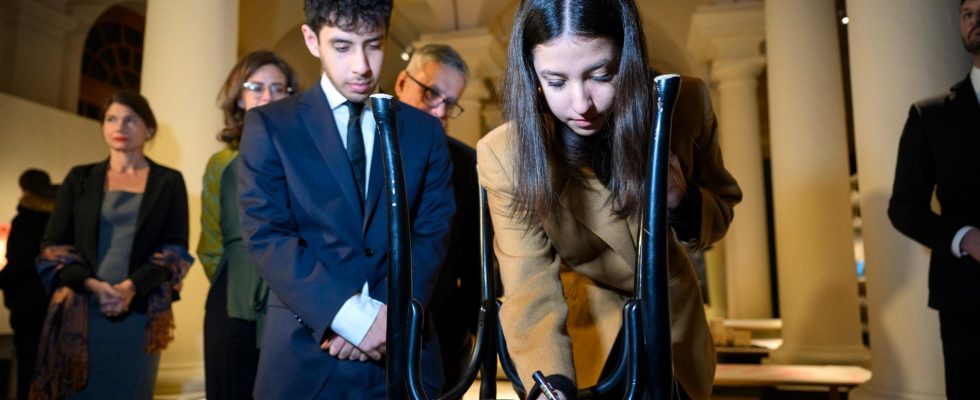full screen
Next
Narges Mohammadi, who is imprisoned in Iran, was represented by his two children, 17-year-old Ali and Kiana Rahmani at the Nobel Prize Museum on Wednesday. They visited Stockholm together with their father Taghi Rahmani, husband of Narges Mohammadi, and signed a chair and handed over several objects to the museum.
1 / 2Photo: Jessica Gow/TT
Peace laureate Narges Mohammadi’s daughter is proud of her mother – and has accepted that they may never see each other again.
– Of course I’m very sad, because I wish I had my whole family, a normal family, says Kiana Rahmani.
Narges Mohammadi was awarded the Nobel Peace Prize on Sunday for her work for women’s rights in Iran. She has opposed the oppression of women, the compulsion to wear the veil and the state’s violent and repressive methods.
Because of her fight for democracy and women’s rights, Mohammadi is imprisoned in the notorious Evin prison in Tehran. She has received a prison sentence of ten years and in addition a sentence of 153 lashes.
On site in the Nobel Prize Museum in Stockholm on Wednesday, Mohammadi’s 17-year-old daughter Kiana Rahmani says that it has been almost two years since they were last able to talk to Narges Mohammadi.
– I have long ago accepted that I will not see my mother again. And I understand what she is fighting against, she is fighting against things that shouldn’t exist, tyranny, lack of democracy, says Kiana Rahmani to TT.
Big miss
Daughter Kiana Rahmani lives in Paris with her twin brother Ali Rahmani and their father Taghi Rahmani.
Narges Mohammadi has been a fantastic mother, says Kiana Rahmani. And there is a great missing for the mother.
– Of course I’m very sad, because I wish I had my whole family, a normal family.
– When I miss my mother, I tell myself to be strong: “You are a privileged person, you don’t live in danger, she fights for people who need her and are in danger”.
Mohammadi has managed to smuggle messages out of prison – and Kiana Rahmani thinks her mother’s voice is now stronger than ever before.
Health problems in prison
– It would be a disaster for my country if people like my mother didn’t exist, because we really need democracy and freedom. We need not only to survive but also to live.
– I also want to express my gratitude to all the brave people in Iran who are fighting and facing so much danger, because they are the lionesses and lions of Iran.
The family has heard that Narges Mohammadi has some health problems, including that she has problems with her joints, and that she needs hospital care. But to be taken to a hospital she needs to wear a hijab, which she refuses. However, the family has received information that she was taken to hospital, but they do not know for sure what happened to her.
In the uncertain situation, Kiana Rahmani finds it difficult to assess what the future will look like for her family.
– I can’t imagine that we will be reunited soon. Maybe never. But I can say that I will do my best to be an activist.
FACTS Narges Mohammadi
Narges Mohammadi, born in 1972 in Zanjan, Iran, is an Iranian human rights activist of Kurdish origin.
She trained as a physicist at Imam Khomeini International University and worked as an engineer until she was dismissed for political reasons in 2010.
During her studies, she met her future husband Taghi Rahmani, journalist, author and human rights activist. The couple has two children.
Narges Mohammadi is active in the Iranian organization Defenders of Human Rights Center, which provides political prisoners with defense lawyers. She is also one of the founders of the Iranian National Peace Council, which consists of writers, artists, lawyers and activists working for human rights in Iran.
For her fight for democracy and women’s rights, and against keeping political prisoners in detention without trial, Narges Mohammadi has been sentenced to many years in prison and a travel ban. She is currently imprisoned in the infamous Evin Prison in Tehran, where, according to Amnesty International, among others, the prisoners are regularly subjected to torture, long-term isolation, abuse and are denied medical care. Often people are imprisoned in Evin after short, summary trials where the accused are denied a lawyer.
Over the years, Narges Mohammadi has received several prestigious awards for his fight for human rights.
Read more
